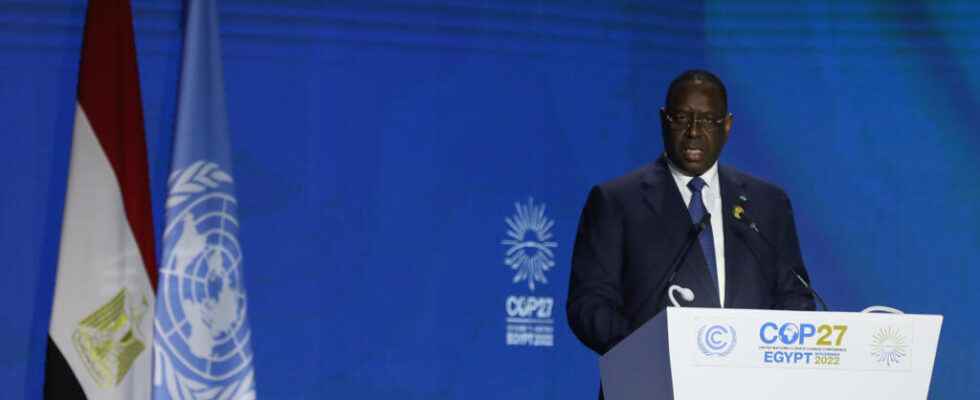More than 140 heads of state and government are meeting in Sharm-el-Sheikh to try to relaunch action against global warming. On November 7, 2022, African leaders called on the countries responsible for historic emissions, the rich countries, to assume their responsibilities by disbursing the financing promised to poor countries. Especially since these countries provide immense climate services, in particular thanks to their forests.
With our special correspondent in Sharm-el-Sheikh, Claire Fages
The first African leader to speak from the podium, Senegalese President Macky Sall, who is also the current chairman of the African Union, spoke on behalf of the whole continent. We must act in Sharm-el-Sheikh to make history and not suffer it, he insisted. Africa must receive the funding promised in the name of the climate debt and the services it renders with its forests.
” I remind you that with the forest of the Congo Basin, our continent is home to a quarter of what still remains of tropical forest, offering the planet one of these rare green lungslaunches the Senegalese president. We also want to move forward in adapting to climate change. We bear the cost with the development of green projects often financed by recourse to debt, even though the implementation must be financed by donations in accordance with the agreed commitments. The right to a green transition adapted to their level of development must also be recognized.
Calls to protect the Congo Basin forest
The Congo basin captures more than 30 billion tons of CO2, also underlined the President of the Republic of Congo. According to Denis Sassou-Nguesso, the Congolese population became aware very early on of the need to maintain and increase the country’s forest cover.
” For forty years, our entire population has been invited to plant a tree as part of National Arbor Day, celebrated in our country on November 6 each year. This type of proactive action, combined with a rigorous Forest Code, has enabled us to maintain one of the lowest deforestation rates in the world. “, declared the Congolese president.
For his part, the Gabonese President, Ali Bongo Ondimba, regrets the delay of the rich countries in disbursing the promised funding, given the services provided by the Gabonese forest.
” The Gabonese Republic, like other developing countries, should be able to receive several hundred million dollars a year from this promise. This is to finance our adaptation to climate change, our just energy and economic transition and to reward our net carbon sequestration efforts. “, for his part, declared the Gabonese president.
Ali Bongo switches to English to recall the very recent certification of Gabonese carbon credits by the UN Climate, before discussing the next One Forest Summit in 2023 in Libreville.
►Also read : In Gabon, the temptation of a more productive timber industry
Need help with the consequences of climate change
Adaptation needs and “loss and damage” related to climate change are not an abstraction in Africa, underlines Kenyan President William Ruto. His country faces worst drought in 40 years. “ Two consecutive years without rain have plunged millions of people into misery. 2.5 million head of cattle have died in Kenya this year alone, causing more than $1.5 billion in losses. Two days ago we distributed food aid to 4.3 million people as part of an emergency plan that asked us to reallocate funds earmarked for health and educationexplains the Kenyan president. The trade-offs we are forced to make between essential public services are proof that climate change directly threatens the lives, health and future of our populations. »
Wildlife, Kenya’s precious heritage, has not been spared, continues William Ruto. Spokesperson for the Africa group at COP27, he estimates the cost for the continent at 50 billion dollars per year by 2050 and he deplores the unfulfilled promises of funding to help it overcome these disasters, even though Africa, he says, offers solutions to climate change, thanks to its natural resources and the very proactive deployment of green energies.
” Rich countries are the main perpetrators of this endangerment of humanity »
For his part, the President of the Central African Republic Faustin-Archange Touadera did not mince his words towards the rich countries: “ The exceptional climatic crises of recent years have had far-reaching devastating effects on the survival of humanity. The rich countries, major polluters, are the main authors of this endangerment of humanity. Africa […] must not continue to pay for crimes she did not commit […]. Rich countries should help poor countries implement their national voluntary reduction action plans. »
For its part, Within Africa, the Sahel is undoubtedly the region with the greatest vulnerabilities and as such deserves special treatment in view of the combined challenges it faces. We can never say it enough, the violence that is ravaging the Sahel today is largely linked to the climatic disaster that this region is undergoing.
►Also read: Interview – COP27: “What vulnerable populations need is not an agenda, it’s finances”
